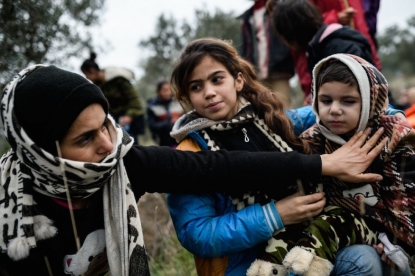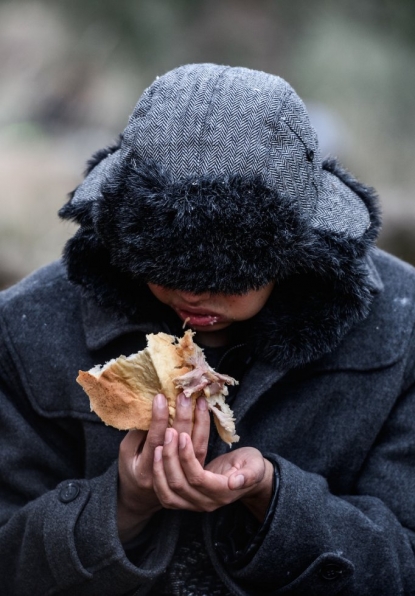What if this baby were mine?
Canakkale, Turkey, February 1, 2016 -- The baby is the first dead body I see when I get to the beach. He looks like he is nine or ten months old. He is dressed warmly and was wearing a hat. An orange pacifier is attached to his clothes. Near him floats a child of eight or nine years. Next to them a woman. Their mother perhaps.
 The pacifier attached to the clothes of a drowned refugee baby boy. January 30, 2016. (AFP / Ozan Kose)
The pacifier attached to the clothes of a drowned refugee baby boy. January 30, 2016. (AFP / Ozan Kose)I take a few photos. I walk along the beach. I see the body of another child on a rock. Later, I will have nightmares, I will spend hours not being able to speak. But at the moment, I don’t really feel anything, to be honest. The Turkish police are collecting the bodies. They drowned the night before in the waters off this coast. There are so many bodies. I can’t count them all.
For the moment, noone is taking care of the dead baby. I return to him and stay there, for about an hour, silent. I have a baby boy who is five months and a daughter who is eight years old. I ask myself what I would do if this were my baby. I ask myself what is happening to humanity.
 Migrants at a campfire after being cheated by smugglers. January 29, 2016. (AFP / Ozan Kose)
Migrants at a campfire after being cheated by smugglers. January 29, 2016. (AFP / Ozan Kose)I have been in Turkey’s Cannakale region for several days. It’s a coastal region on the Turkish side of the Aegean Sea, where thousands of refugees from Syria, Iraq and elsewhere have gathered hoping to catch a boat to the Greek island of Lesbos, just across the waters.
 Refugees from Syria and Afghanistan. January 27, 2016. (AFP / Ozan Kose)
Refugees from Syria and Afghanistan. January 27, 2016. (AFP / Ozan Kose)The situation here is very tense.
 Migrants wait in the woods after being cheated by smugglers. January 29, 2016. (AFP / Ozan Kose)
Migrants wait in the woods after being cheated by smugglers. January 29, 2016. (AFP / Ozan Kose)The day before I was in the woods with dozens of migrants who had been cheated by the smugglers. They paid a small fortune to board a boat for Greece, but the boat that was to carry them across turned out to be much smaller than promised. Afraid of drowning, the migrants refused to get on board. The smugglers threatened them with firearms.
 Migrants walk away from a beach after being cheated by smugglers. January 29, 2016. (AFP / Ozan Kose)
Migrants walk away from a beach after being cheated by smugglers. January 29, 2016. (AFP / Ozan Kose) A Syrian migrant looks out onto the sea after being stopped by Turkish police in his attempt to reach the Greek island of Lesbos. January 29, 2016. (AFP / Ozan Kose)
A Syrian migrant looks out onto the sea after being stopped by Turkish police in his attempt to reach the Greek island of Lesbos. January 29, 2016. (AFP / Ozan Kose)The migrants, warming up by campfires as they waited to find another boat to take them to the promised land of Europe, were happy to see me, to share their problems with me.
 Migrants wait in the woods after being cheated by smugglers. January 29, 2016. (AFP / Ozan Kose)
Migrants wait in the woods after being cheated by smugglers. January 29, 2016. (AFP / Ozan Kose) A refugee boy eats while camping after migrants were cheated by smugglers. January 29, 2016. (AFP / Ozan Kose)
A refugee boy eats while camping after migrants were cheated by smugglers. January 29, 2016. (AFP / Ozan Kose) A woman changes her baby after migrants were cheated by smugglers. January 29, 2016. (AFP / Ozan Kose)
A woman changes her baby after migrants were cheated by smugglers. January 29, 2016. (AFP / Ozan Kose)The children kept asking their parents, “So when are we going to get onto a boat?”
 Migrants wait in the woods after being cheated by smugglers. January 29, 2016. (AFP / Ozan Kose)
Migrants wait in the woods after being cheated by smugglers. January 29, 2016. (AFP / Ozan Kose)Were some of those people with whom I spoke in those woods on board the overcrowded boat that sank in calm weather overnight between Friday January 29 and Saturday January 30 a few hundred meters from the coast?
Definitely. Maybe. Difficult to say.
 Migrant father and child. January 27, 2016. (AFP / Ozan Kose)
Migrant father and child. January 27, 2016. (AFP / Ozan Kose) Migrant mother and child. January 27, 2016. (AFP / Ozan Kose)
Migrant mother and child. January 27, 2016. (AFP / Ozan Kose) Migrant mother and child. January 27, 2016. (AFP / Ozan Kose)
Migrant mother and child. January 27, 2016. (AFP / Ozan Kose)That Saturday morning I am awakened around 7:00 am by sirens of numerous ambulances. My hotel is right next to the coast guard base. I realize right away that something serious must have happened.
When I get to the base, a boat docks. Bodies in plastic bags are taken off. I count around ten. There are also numerous survivors, including women and children. I get closer. They are from Syria, Iraq, Afghanistan, Myanmar and Bangladesh. They are all in a state of shock.
They tell me that the weather was good, that the sea was calm, but that there were too many of them on the boat. It was a small tourist boat, with a capacity for 20 to 30 passengers. When it sank, it was carrying more than 100 refugees, each of whom had paid 1,200 euros to the smugglers to get on board.
 Turkish police look for bodies on a beach. January 30, 2016. (AFP / Ozan Kose)
Turkish police look for bodies on a beach. January 30, 2016. (AFP / Ozan Kose)Police take the survivors to question them and I decide to get closer to where the sinking took place. The boat went down less than a kilometre from the coast, near the village of Bademli. When I get to the spot, I see the half-sunken wreck that’s now floating some 50 meters from shore.
 The boat that sank with more than 100 refugees aboard. (AFP / Ozan Kose)
The boat that sank with more than 100 refugees aboard. (AFP / Ozan Kose)The beach is covered by life jackets, personal effects and the bodies spat out by the cold Aegean waters. Including that of the baby at whose side I now sit.
As a photographer, I have covered riots and attacks. I’ve seen dead bodies. But this, this is the worst of them all.

I look at his tiny body and I ask myself why. Why this interminable war in Syria. Rage fills me. Rage against all the politicians who have caused this, against all those smugglers who send people to their deaths.
Eventually a policeman comes, lifts the baby and puts him in a plastic bag. He too is crying.
Ozan Kose is an AFP photographer based in Istanbul. Follow him on Twitter.
This blog was written with Roland de Courson and translated by Yana Dlugy in Paris.

Turkish gendarmes carry the body of a migrant on a beach in Canakkale's Bademli district on January 30, 2016 (AFP / Ozan Kose)


